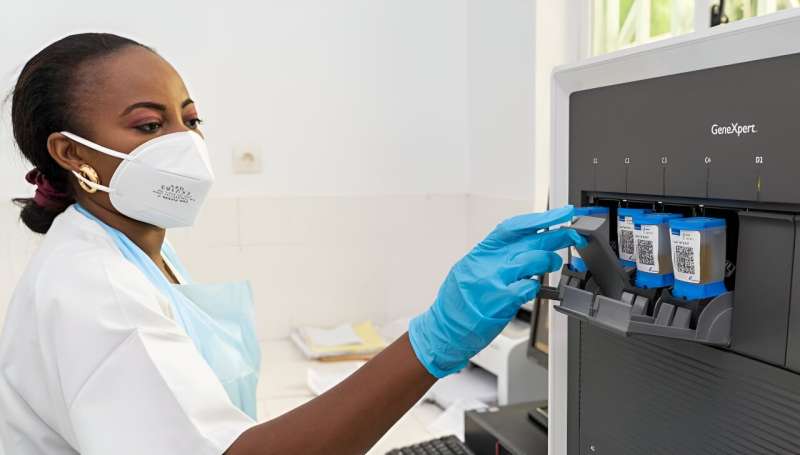This article has been reviewed according to Science X's editorial process and policies. Editors have highlighted the following attributes while ensuring the content's credibility:
fact-checked
proofread
Uncovering missing tuberculosis cases 'key to elimination'

In the journey towards a world free of tuberculosis (TB), the crucial first step begins with identifying individuals affected by the disease.
Globally, around 1.3 million people died from TB in 2022, making it the second leading infectious killer after COVID-19, according to the World Health Organization (WHO).
However, many people with the disease, which is particularly prevalent in the Asia Pacific region and Africa, do not even get properly diagnosed.
Public health experts say the task of tracing these missing cases requires a three-pronged approach, involving community engagement, scaling up the use of available technologies, and effective program management.
"By putting communities at the core, you ensure that they are fully involved in the process of making their villages TB-free," said Prabodh Bhambal, executive director of the Union South East Asia (USEA) Trust, at a webinar organized by Citizen News Service (CNS) this week (19 March).
The USEA Trust is an independent trust hosted by the International Union Against Tuberculosis and Lung Disease (The Union) in New Delhi, with a flagship project that aims to transform 1,000 villages into TB-free villages with support from the JSW Foundation, the social development arm of JSW Group, an Indian conglomerate whose businesses include steel, cement, automotive and paints.
The WHO estimates that India grapples with the world's most extensive tuberculosis epidemic. In 2022, the country reported an incidence rate of 199 cases per 100,000 individuals in its population.
In Uganda, where there was a similar incidence rate of 198 cases per 100,000, the government is using mobile vans to conduct screenings in local communities as part of an awareness, testing and prevention campaign.
At the core of the campaign is the acknowledgment that relying solely on communities to visit health facilities doesn't ensure uptake of services or effectively control TB at the community or household level.
The campaign emphasizes the need for a collective desire for change, inspiring individuals to take action and voluntarily seek health care services. The aim is to enhance case-finding, address missing TB cases within communities, tackle treatment defaulting, and improve the use of prevention measures.
Stavia Turyahabwe, assistant commissioner for TB and leprosy at Uganda's Ministry of Health, says this approach has been highly effective. In 2022, more than 94,000 Ugandans were diagnosed with TB through the initiative, significantly contributing to improved disease detection rates, she told a two-day summit on TB and leprosy in Kampala this week (19-20 March).
However, she added that the ministry had yet to assess its impact on TB prevalence.
Harnessing technology, AI
Bhambal suggests that, by effectively harnessing current technologies for TB screening and diagnosis, a substantial portion of the undetected TB cases can be identified.
"In the small population of 5,000 people that we have screened so far under our project, we screened based on symptoms, used portable X-rays, and utilized an AI app."
"Through this comprehensive approach, we have successfully detected cases of TB that would have otherwise been missed if we had relied solely on symptoms," explained Bhambal. "Technology plays a crucial role in finding these cases; we just need to find the right mix."
Charles Olaro, director of clinical services at Uganda's Ministry of Health, highlighted various innovations being employed in the country's fight against TB, including GeneXpert technology, which rapidly diagnoses TB disease and drug resistance.
"We are not solely dependent on the microscope," he said. "For any slides that test positive, we analyze them for drug resistance using the GeneXpert."
Sriram Natarajan, co-founder of Indian diagnostics company Molbio Diagnostics, highlighted the limitations of microscopy in terms of detection.
However, he added that over the last decade, the WHO has approved molecular diagnostic tools capable of being deployed even in the doctor's surgery.
He said these molecular tools boast sensitivity rates of up to 98 percent, meaning that patients can be diagnosed at an early stage. However, despite these tools being available for about a decade, only about 25 to 30 percent of TB cases globally are being diagnosed using them, according to Natarajan.
"We now have at least two available tools, but the uptake remains a major concern," he told the CNS webinar.
"Both countries and their programs need to commit to implementing these tools at the primary level to ensure that everyone receives a molecular test as a confirmatory tool."
Investment 'crucial'
Natarajan says more commitment is needed from global funding agencies to focus on making these tools affordable and accessible to all.
"If we truly want to end TB by the target year of 2030, these interventions need to be scaled up and accelerated," he added. "It's crucial that these efforts are taken seriously."
Lucica Ditiu, executive director of the Stop TB Partnership, told the CNS webinar, "It is possible to end TB. We see high-burden countries finding and treating TB."
High-burden countries include India, Indonesia, Bangladesh, Nigeria, South Africa and Ethiopia.
"I want to say that, in many countries, private sector engagement is crucial to finding and treating all TB patients," Ditiu added.
Guy Marks, respiratory medicine expert at the University of New South Wales and president and interim executive director of The Union, says TB must be treated as a public health problem, not merely an individual patient care issue.
"We must be brave and recognize that the current strategy to end TB in high-burden countries is not achieving the results we hope for," he said.
"We need to change our approach if we are to win the fight against this infectious disease."



















